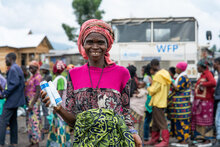WFP School Meals In Jeopardy For Children In Mali As School Year Starts
“This is critical. School meals are often the only nutritious meal a child receives a day, relieving families from further financial stress, motivating parents to send their children to school, and, ultimately, serving as a vehicle for education,” said Silvia Caruso, WFP Mali Country Director.
“Teachers tell us that if the meals are no longer provided, there is a significant risk that parents will stop sending their children to school; children find it difficult to walk long distances to school or stay in class for a full day on an empty stomach,” added Caruso.
Despite the high levels of insecurity–especially in northern and central Mali since 2012, WFP and its partners were able to provide school meals to an average of 170,000 children per year, half of which were girls.
WFP’s school meals were instrumental in in the Government’s 2015 back to school campaign, encouraging families to let their children resume their studies in regions such as Mopti, Timbuktu and Gao which had been bearing the brunt of the conflict, and where schools were closed between 2012 and 2015.
“We urge our supporters not to forget the children of Mali. They have been through a lot these past years. Going to school helps them regain their childhood, and school meals play an important role in keeping them in school,” says Caruso.
WFP works closely with the Ministry of Education to implement the school meals programme - a priority for the Government of Mali, which approved a national school feeding in 2009.
Since 2010, Mali has faced successive food security crises, brought on by irregular rainfall and prolonged insecurity in the North. More than a quarter of the population suffers from moderate and severe food insecurity; of this, almost half a million are severely food insecure.
Even in peaceful years, malnutrition rates in Mali are among the highest in the world. According to a 2014 national survey, the average prevalence of global acute malnutrition (GAM) in children under five stands at 13 percent. The World Health Organization rates a GAM prevalence between 10-14 percent as serious, and above 15 percent as a critical emergency.
WFP partners with small-scale farmers to buy locally grown, fresh food for its school meals programmes, boosting agricultural incomes and local economies as well as feeding hungry children.
# # #
WFP is the world's largest humanitarian agency fighting hunger worldwide, delivering food assistance in emergencies and working with communities to improve nutrition and build resilience. Each year, WFP assists some 80 million people in around 80 countries.
Follow us on Twitter: @WFP_WAfrica, @WFP_media
For more information, please contact (firstname.secondname@wfp.org):
Laura Lee Morris, WFP/Bamako: +223 75 81 44 67
Adel Sarkozi, WFP/Dakar: +221 77 637 59 64


